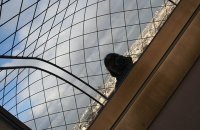I sat in the food court watching teenagers giggle at boys, moms buy their toddlers happy meals, and one guy pick his nose while munching on a burger. I'd just finished a plate of nachos and beside me Jon was working on the last remnants of his hot dog. Across the table Alex took a deep, happy breath. "So," he said, smiling, "are we ready for bowling?"
Rabat is many things. It's easy to navigate, largely hassle-free, and with so many foreign officials and ex-pats running around there is almost zero harassment. There are spots everyone knows and loves and shares, and secret places people call their own. It's a place where volunteers can drop the affectations they put on in their sites and simply be for awhile, which is a more powerful thing than you can imagine. But it still looks and feels very much like Morocco; from the calls to prayer and immense minarets to the medina and kasbah by the sea, you'll never forget where you are. That is until you hit Mega Mall.
We'd only recently learned of its existence, and while we'd heard any number of stories about the wonders it held, none of us really believed what we were being promised as we entered the place. The security guard waved his metal detector over us and, with a glare, let us loose inside.
I can only describe it as a mall. Three floors, though its total footprint could have been only 100 yards long, with escalators and elevators and high-end stores left and right. It's assumed the only people coming here would be those with cash to burn. Just to the left of the entrance is a lingerie store.
We hurried down to the food court and soaked it in. There was a Domino's, sushi, Italian, Tex-Mex, gelato, and in the far corner there was real live honest to goodness ice rink. I rushed over but was quickly turned away by security. If I had no ticket, I could not enter. I explained how I just wanted to peek, but they held their ground. A small child carrying a hockey bag walked past - he played for the Rabat Capitals, he explained, and had practice soon. Aieee!
I pleaded with the guard one last time, begging for the chance to smell the ice and Zamboni exhaust and coolant that means, well, home. They still said no, and I slunk off.
Everything felt tempting, but I finally settled on a plate of nachos and, after putting down the same amount of money I usually spend on a week's worth of food, dug in. It was glorious.
We made our way to the bowling alley, and again were turned away. It was league bowling time, and the lanes wouldn't be free for two hours. Could we just go in and peek? No. We turned back towards the food court and puzzled over which gelato to try. Then we sat down and people watched. We were in Morocco, yes, but this was the first time I'd ever truly felt I could be somewhere else. The teenagers and couples and families around us were dressed in largely western style, toted shopping bags and baby strollers and take-out dinners, and made us feel utterly, completely relaxed.
There's an episode of This American Life that opens in a food court with a bunch of teenagers sitting beside a Sbarro's, and when I first heard it I was hit with one of my few true moments of homesickness. I don't much like malls or food courts or Sbarros or even teenagers. I didn't want to be there. It was simply the reminder of this wholly common, ordinary, American place that hit me in an unexpected way.
My life is so detached from anything even remotely 'normal' in the States that any reminder of the truly mundane hits in a strange, piercing way; the notion that such a thing exists at all is jarring. The Peace Corps office has a huge grass lawn to picnic, lay, or simply frolic on. It reminds you of America in a very deep, weird, almost subconscious way. And its feels wonderful.
But what was even more odd (to us) was that of the many influences American culture has had on Morocco, this is one of the things that got transported. And not just the concept; there's a mall, fully replicated, in Morocco, seemingly picked up and shipped wholesale to Rabat. As Jon said, taking a last look around before we left, "You guys, we did this."
"Well, obviously not very well," replied Jeremy as we made our way back out, "There's not even a Starbucks".


